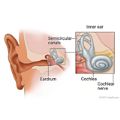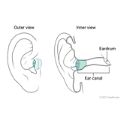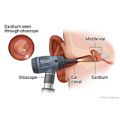Our Health Library information does not replace the advice of a doctor. Please be advised that this information is made available to assist our patients to learn more about their health. Our providers may not see and/or treat all topics found herein. Hearing loss is a sudden or gradual decrease in how well you can hear. Gradual hearing loss happens over time. It can affect people of all ages. Hearing loss may range from slight to profound. Depending on the cause, hearing loss may improve with treatment (reversible) or be lasting (permanent). The most common causes of hearing loss are noise and aging. Being exposed to everyday noises, such as using a power lawn mower, can lead to hearing loss over many years. As you get older, changes in the inner ear cause slow but steady hearing loss. Many other things can cause hearing loss too. Common symptoms of hearing loss include muffled hearing and a feeling that your ear is plugged. You may have trouble understanding what people are saying, especially when there is background noise, such as a radio. You may listen to the TV or radio at a higher volume than in the past. Your doctor will do a physical exam and ask about your symptoms and past health. The doctor also may look in your ears with a lighted device. If your doctor thinks that you have hearing loss, you'll have hearing tests to check whether you have hearing loss and how severe it is. Treatment depends on the type and cause of hearing loss. Permanent hearing loss can be treated with hearing aids or devices that alert you to sounds around the house like the doorbell. If hearing aids don't work for you, cochlear implants may be an option. Reversible hearing loss can often be treated successfully. The most common causes of hearing loss are: Noise-induced hearing loss can happen slowly over time. Being exposed to everyday noises, such as listening to very loud music or using a power lawn mower, can damage the structures of the inner ear. This can lead to permanent hearing loss. Sudden, loud noises, such as an explosion, can also damage your hearing. In age-related hearing loss, changes in the inner ear that happen as you get older cause a slow but steady hearing loss. The loss may be mild or severe. It is always permanent. Other causes of hearing loss include earwax buildup, an object in the ear, injury to the ear or head, an ear infection, a ruptured eardrum, and other conditions that affect the middle or inner ear. Some medicines also can cause it. And some people are born with hearing problems. Being exposed to loud noise over and over is one of the most common causes of permanent hearing loss. It usually develops slowly and without pain or other symptoms. You may not notice that you have hearing loss until it is severe. Here are some steps you can take to lower your risk of noise-induced hearing loss. You can be exposed to harmful noise at work, at home, and in many other settings. Know what kinds of situations can cause harmful noise levels. To learn more about hearing protection in workplaces in the United States, contact the Occupational Safety and Health Administration (OSHA). If you know you are going to be around harmful noise, wear hearing protectors, such as earplugs or earmuffs. Reduce the noise in your life by turning down the volume on the stereo, TV, or car radio, and especially on personal listening devices with earphones or ear buds. After noise-related damage to the ear is done, it cannot be reversed. But if you already have some noise-related hearing loss, it is not too late to prevent further damage and preserve the hearing that you still have. Being exposed to loud noise over and over is one of the most common causes of permanent hearing loss. But there are other causes of hearing loss. Here are some steps you can take to lower your risk of other types of hearing loss. Never stick a cotton swab, hairpin, or other object in your ear to try to remove earwax or to scratch your ear. The best way to prevent earwax problems is to leave earwax alone. If you have an upper respiratory problem (such as a cold, the flu, or a sinus infection), take a decongestant a few hours before landing or use a decongestant spray just before landing. You are more likely to have hearing loss if you smoke. Receive all the recommended immunizations to protect against pneumococcal disease, meningitis, and other conditions that can cause hearing problems. Common symptoms of hearing loss include: Other symptoms may include: People who have hearing loss are sometimes not aware of it. Often, family members or friends are the first to notice the hearing loss. Social situations can be tiring and stressful for people who don't hear well. They may start to avoid those situations as their hearing loss gets worse. Many adults become depressed because of how hearing loss affects their relationships and social life. Hearing loss can happen slowly or suddenly. It's often a natural result of aging. Long exposure to loud noise can make it worse. If hearing loss is caused by something that can be treated, hearing will sometimes come back. But most hearing loss is permanent. Hearing aids and other devices can help. Hearing loss can be temporary or permanent. Hearing loss can range from slight to moderate to profound. Call 911 or other emergency services immediately if: Call a doctor now if you: Call your doctor if you: Watchful waiting is a wait-and-see approach. Although hearing loss usually isn't dangerous, it can affect your personal safety. It can also reduce how much you can do in the workplace and at home and limit you socially. It's important that you talk to your doctor about hearing loss. To diagnose hearing loss, your doctor will do a physical exam and ask about your symptoms and past health. Your doctor also may look in your ears with a lighted device called an otoscope. If your doctor thinks that you have hearing loss, you'll have hearing tests to check whether you have hearing loss and find out how severe it is. You may be referred to an audiologist for the tests. These tests may include: You may be referred to an ear, nose, and throat specialist for other tests or treatments. Treatment depends on the type and cause of the hearing loss. Your doctor can help you choose the best treatment. Proper treatment is important. Hearing loss may lead to loneliness, depression, and loss of independence. Treatment can make communication, social interaction, and daily activities easier and more enjoyable. Reversible hearing loss can often be treated successfully. Treatment depends on its cause. For example, removing earwax or taking medicine for an infection may help your hearing come back. If you have hearing loss, you may find that it takes extra effort and energy to talk with others. Hearing may be especially difficult in settings where there are many people talking or there is a lot of background noise. The increased effort it takes to be with other people may cause stress and fatigue. You may begin to avoid social activities, feel less independent, and worry about your safety. Hearing devices you may want to use include: Hearing aids make all sounds louder (amplify), including your own voice. Common background noises, such as rustling newspapers, magazines, and office papers, may be distracting. When you first get hearing aids, it may take you several weeks to months to get used to this. Most hearing aids can be adjusted to fit your hearing loss and reduce background noise. These devices make certain sounds easier to hear by bringing the sound directly to your ear. They shorten the distance between you and the source of sound and also reduce background noise. You can use different types of devices for different situations, such as one-on-one conversations and classroom settings or auditoriums, theaters, or other large public spaces. Commonly used listening devices include telephone amplifiers, personal listening systems (such as auditory trainers and personal FM systems), and hearing aids that you can connect directly to a television, stereo, radio, or microphone. These devices alert you to a particular sound (such as the doorbell, a ringing telephone, or a baby monitor) by using louder sounds, lights, or vibrations to get your attention. Closed-captioning shows the words at the bottom of the screen while you're watching TV or your computer screen. Most newer TVs and online programs have a closed-captions option. You can type messages and send them from your mobile device to someone else's. You can also use voice-to-text if you have trouble typing. A TTY (also called TDD, or telecommunication device for the deaf) allows you to type messages back and forth on the telephone instead of talking or listening. When messages are typed on the TTY keyboard, the information is sent over the phone line to a receiving TTY and shown on a monitor. A telecommunications relay service (TRS) makes it possible to call from a phone to a TTY or vice versa. Many other communication devices, such as pagers, fax machines, email, and custom calling features offered by phone companies, can be helpful. To get more information about selecting and using listening, alerting, and telecommunicating devices, talk to an audiologist. It's easy for a person with hearing loss to feel cut off from conversations and social interactions. But you can take steps to help keep this from happening. It can help to use the person's name. Make sure that the person can see your face, mouth, and gestures. Arrange furniture and lighting so that everyone in the conversation is visible. Your facial expressions and gestures can provide helpful clues about what you are saying. It's best to speak slowly and clearly. But don't shout. If a certain word or phrase isn't understood, find another way to say it. Don't talk about the person as though the person isn't there. Current as of: October 27, 2024 Author: Ignite Healthwise, LLC Staff Current as of: October 27, 2024 Author: Ignite Healthwise, LLC Staff Clinical Review Board This information does not replace the advice of a doctor. Ignite Healthwise, LLC disclaims any warranty or liability for your use of this information. Your use of this information means that you agree to the Terms of Use and Privacy Policy. Learn how we develop our content. To learn more about Ignite Healthwise, LLC, visit webmdignite.com. © 2024-2025 Ignite Healthwise, LLC.Hearing Loss
Condition Basics
What is hearing loss?
What causes it?
What are the symptoms?
How is it diagnosed?
How is hearing loss treated?
Cause
Learn more
Prevention
Preventing hearing loss not caused by noise
Learn more
Symptoms
What Happens
Types of hearing loss
When to Call a Doctor
Watchful waiting
Exams and Tests
Learn more
Treatment Overview
Learn more
Self-Care
Learn
more
Hearing Devices
Learn more
Giving Support
Related Information
Credits
Clinical Review Board
All Ignite Healthwise, LLC education is reviewed by a team that includes physicians, nurses, advanced practitioners, registered dieticians, and other healthcare professionals.
All Ignite Healthwise, LLC education is reviewed by a team that includes physicians, nurses, advanced practitioners, registered dieticians, and other healthcare professionals.
Our Health Library information does not replace the advice of a doctor. Please be advised that this information is made available to assist our patients to learn more about their health. Our providers may not see and/or treat all topics found herein. Current as of: October 27, 2024 Author: Ignite Healthwise, LLC Staff Clinical Review BoardHearing Loss
All Ignite Healthwise, LLC education is reviewed by a team that includes physicians, nurses, advanced practitioners, registered dieticians, and other healthcare professionals.






